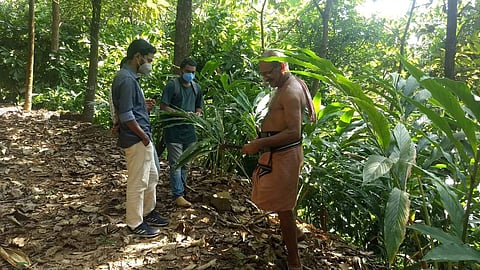

Farming, over the past few years, has transformed itself with the help of AI and Big Data. And that change has come from the young, coupled with the ancient knowledge that our farmers possess. This is precisely why the story of these four youngsters and their start-up DeepFlow Technologies is the perfect example for how farming in Kerala is getting a reboot. Atthri Anand. Vishnu B Raj, Nandakishor M and Sayanth N S are a group of four engineers from Government Engineering College, Kannur who are in the developmental phase of introducing exciting innovations in agriculture. Excerpts from a chat:
What was the idea behind DeepFlow?
We had this group in college itself and we would go to participate in various institutions. We would come together to propose products in different competitions and win prizes. In 2019, during one of them, we got this idea for a robot that could benefit the farmer by removing weeds from the crops. And that was the starting point for us.
What are the products and services you currently offer farmers?
We provide deep technologies - Machine Learning, Artificial Intelligence and Internet of Things. We leverage this expertise to provide farming solutions to cultivators of cash crops like spices, tea and coffee in the area around Kannur and Wayanad. Our vision is to provide end-to-end solutions for farmers to tackle crop health issues like disease and pest control, fertilisation management, market price prediction and so on.
How does this help the farmer exactly?
We provide personalised visits to the concerned farmer to check the process of cultivation that they follow. We provide a personalised mobile application which would, in turn, provide day-to-day recommendations on cost, risk and revenue aspects of farming. We will leverage the data obtained from personalised visits and remote satellite imagery which will be processed by a centralised AI recommendation engine. This will ultimately give suggestions on crop health monitoring in Malayalam. This will provide minute assistance with regards to watering the crop, proper sunlight, soil control for NPK (nitrogen, phosphorous and potassium) values. The end goal is to improve crop quality as well as yield.
And how do you make these recommendations for the farmers?
Currently what we offer is a calendar based recommendation system that provides instructions on a daily basis.
Does the farmer's feedback have a place in this?
Yes, the system in place has the facility of providing feedback, for instance an anomaly detected on field by the farmer. It can be done through the application itself. They can even raise queries and we will provide assistance on it.
What comes next for DeepFlow?
We are trying to introduce market linkages for the service availers. We will be in connection with certain market players like the Spices Exporters Forum and Spices Board. Essentially we are trying to streamline the process of product transfer in order to obtain maximum value to the farmers for their produce. This will be leveraged based on the high quality of the product that the farmers have produced.
What regions are you available as of now?
Currently, we offer assistance to farmers in Kannur but in the next few months we are planning to expand to Wayanad and Idukki. We currently are in touch with about 350 farmers.
What other products are you currently developing?
We are currently working on a quadruple-legged robot which would be the first of its kind in India. The current robots are designed to dispense fertilisers on a uniform terrain. Our product will be suited to all terrains. It would also have an AI camera installed in it. We have successfully completed the first prototype of it. It would especially be helpful to small cardamom growers. The produce is highly dependent upon pesticide spraying that is manually done. The robot will help in effective spraying on all terrains and would therefore avoid the poisoning caused by manual spraying.
What hurdles have stopped you?
The first big hurdle is data itself. Because our work involves artificial intelligence and big data, getting honest and authentic data is of paramount importance. But this is not always the case while doing grass root level work when visiting farms. Second challenge is the funding. We are currently involved in many competitions for grants. But we hope it will be resolved sooner rather than later. Finally, the robot we are trying to develop is a first of its kind. So we do not have the luxury of following a template. Hence, it will take a lot of time with respect to its payload, range and crop applicability. Another hurdle is the issue of the physical terrain on which it is supposed to operate on. It would need to be fairly robust in terms of its physical capacity to withstand the terrain's nature.
